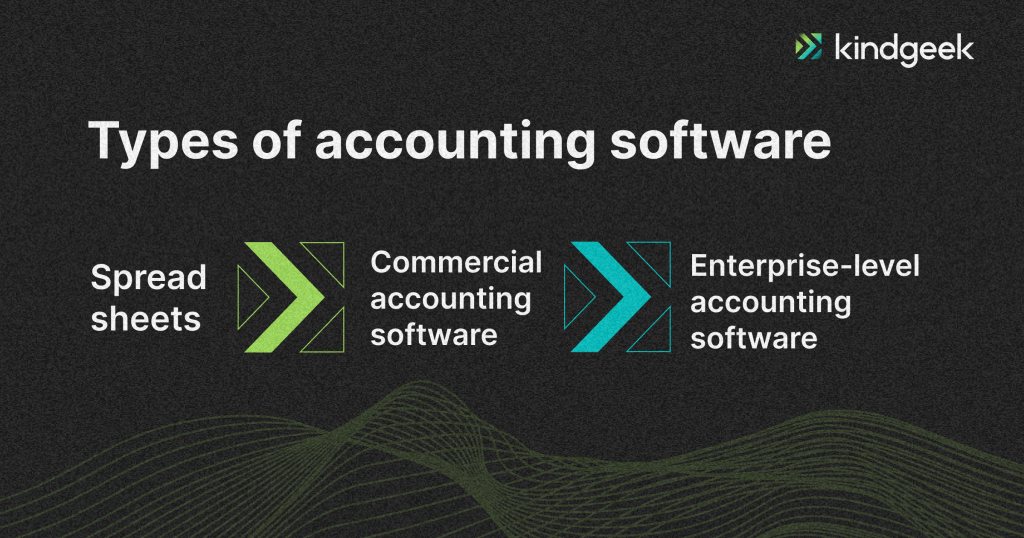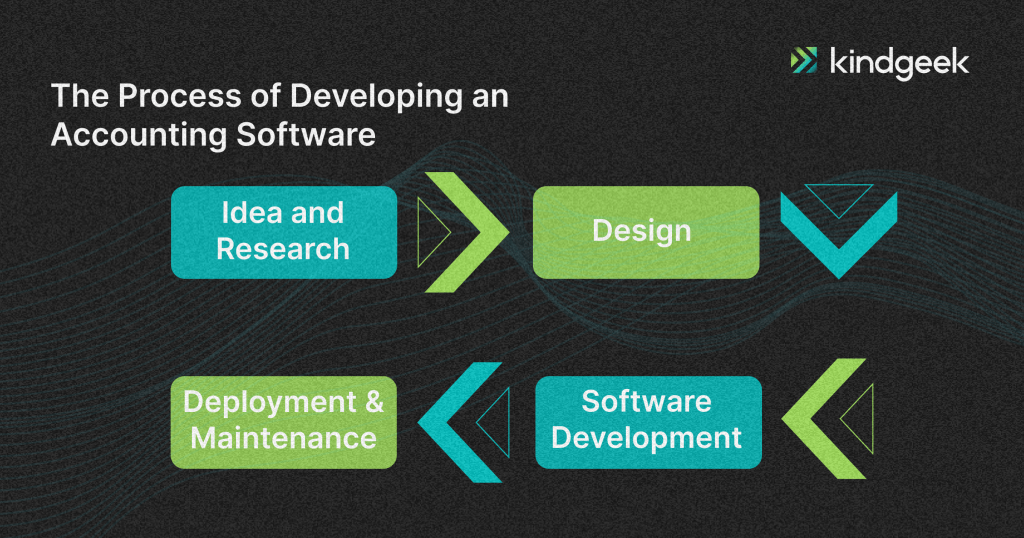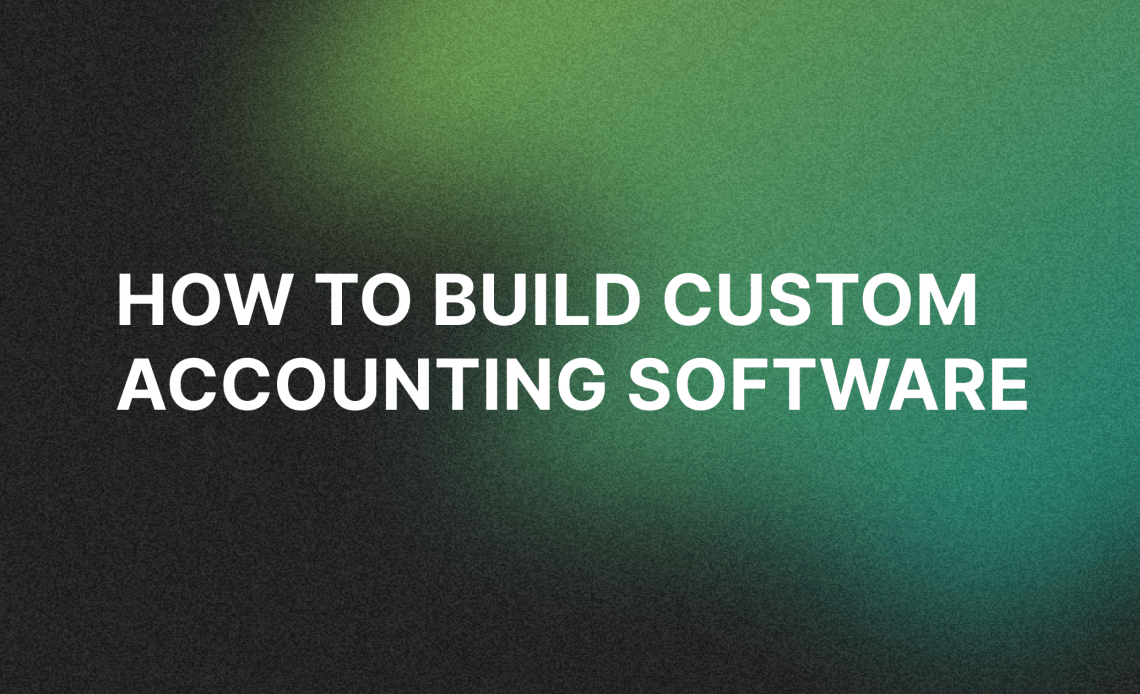Time goes by, but the mind-numbing qualities of accounting are still here, standing tall and strong. Accounting is a complicated process, which is inexorable towards the slightest mistakes, while the possibilities for the said mistakes are numerous. A person who handles accounting should have machine-like accuracy, attention, and control over their emotions when the desire to hit something hard kicks in.
Preparing and examining financial records, ensuring that taxes are properly paid, keeping an eye on laws and making sure that a company’s records comply with them, and much more — sounds as tiring as it actually is. The responsibility is high, the exhaustion is real. Fortunately, we have literal machines that can lift some weight from people’s shoulders. Accounting management software can do wonders for the productivity and well-being of an accounting department while minimizing the possibility of mistakes.
This article will describe accounting software and examine the process of developing one for your company.
Content:
1. Accounting Software Types & Functions
2. Build an Accounting Software with the Must-Have Features
3. Security Considerations in the Development of Accounting Software
4. The Process of Developing an Accounting Software
5. Costs of Custom Accounting Software Development
6. Conclusion
Accounting Software Types & Functions
Accounting software is a program that keeps track of and processes all business accounting transactions. Accounting software comes in different shapes and flavors depending on a company’s structure and size. The types of accounting software include:

- Spreadsheets. The most straightforward software that can be used for accounting on a smaller scale. Spreadsheets are not really specialized software, but they do the work nonetheless. It’s hard to find an accountant who didn’t work with Microsoft Excel or Google Spreadsheets. However, when a company hits the next levels of growth, spreadsheets are not sufficient anymore.
- Commercial accounting software. Middle-sized companies aim for specialized accounting software. Often, those companies use out-of-the-box software created to fit average needs. They may also decide to develop accounting software that will perfectly complement their company.
- Enterprise-level accounting software. This is software for big, established companies. The most viable solution for such giants is to develop a custom accounting system, which more often than not, is a part of the bigger ERP that monitors and controls the entire corporate ecosystem.
Build an Accounting Software with the Must-Have Features
Wondering how to create accounting software that attracts user attention and generates revenue? Explore the most essential features of accounting software for large businesses.
Invoice Processing
Accounting software should allow monitoring and handling of invoices. In addition, a user may print invoices or send them using the app. Ideally, to make the process of invoice management smoother, such software will keep information about clients, such as names, addresses, emails, or other relevant details. Moreover, the app may send invoices automatically to ensure that revenue is received on time.
Tax Processing
There are no escaping taxes in accounting software. Tax-related functionality should include:
- Value-added tax (VAT) and other common tax calculations. An accounting app should calculate VAT for each tax period to avoid mistakes and overdue tax payments. Besides VAT, the system should process other common taxes, such as monthly/quarter federal tax (if you’re in the US), income tax, national insurance tax, etc.
- Tax-deductible expenses. If a company has travel or entertainment expenses that should be taxed as well, accounting software should include them and ensure that the company complies with tax deadlines.
- Common forms. An accounting system should contain the most common tax forms, so the employees have easy access to them. Ideally, the system will input all data into those forms itself.
Payroll management
Paying salaries is a pleasant and yet complicated process. Accounting software should help process payrolls, calculating the total amount to be paid including expenses, bonuses, and taxes. Payroll modules can be of different complexity though: some may have full payroll functionality, while others only have a part.
Reports
Reports are the pain in the life of an accountant. Proper software can lessen the pain by automating the process of creating monthly, quarterly, or yearly reports, be it tax reports or revenue/expense reports for the internal needs of a company. In addition, well-crafted reporting features armed with statistics can be a source of valuable insights.
Banking
It’s nice and desirable when an accounting app has access to a company’s bank account or accounts, helping with setting up basic electronic deposits, managing checks, and credit monitoring.
Besides the mentioned features, accounting software can be synchronized/integrated with other management software used by a company. For instance, ERP or CRM to improve the workflow.
Security Considerations in the Development of Accounting Software
Just like with fintech applications, when you design a business accounting software solution, security should be a major concern. If the system that deals with money, payrolls, taxes, and customer information is compromised, the whole business is compromised. The results can be devastating. The best way to ensure security while developing accounting software for large businesses is to team up with a proficient team of software developers who know how to handle the issue.
In other cases, it’s important to:
– Have secure network firewall protection in place
– Create an accounting software solution with reliable project logic and robust back end structure
– Ensure that a system uses end-to-end encryption when communicating with third-party services (or if the system is web-based accounting software: when communicating with devices)
– Ensure that there is a multiple levels of access feature so only people who need to have access to certain info can interact with it
With cloud accounting software, your system is as secure as the cloud technology it uses. In this case, the best thing the developers can do is to follow all provided guidelines and handle the data well. Cloud-based accounting software should not store any information longer than required or duplicate the data.
The Process of Developing an Accounting Software
If you decide to create custom accounting software to boost the performance of your business, here are the steps a software engineering team will undertake to make accounting software for large companies.

1. Idea and Research
So, you have an idea to build an accounting software system for your company? Great! The idea is the initial impulse. However, the abstract concept is not enough to really kick start the thing. You need a solid foundation for large company accounting software creation. Therefore, you have to distill the idea and crystallize it into an actionable plan. By ‘you’, we mean a team of business analysts and software engineers. Such a team can take the idea, conduct research, determine the exact functionality of the future system and which features are viable. By the end of the phase, you will have an accurate description of the future system’s functionality.
2. Design
After the research is done, it’s time to work on the UI/UX design of the accounting software by creating mockups of the system that would be pleasant to the eye and, what is more important, easy to use. A crafty designer knows how to achieve both using information about a user’s paths and laws of usability and intuitiveness.
Usually, research and design phases are combined into one. At Kindgeek, we call it a discovery phase, read about it more below.
3. Software Development
Now, developers have accurate blueprints of the future system, and they can transform them into digital reality. This is, by far, the longest and most complex part of the accounting system creation. During this stage, back-end software engineers will build the system’s logic, frontend developers will make the design into interactive applications, mobile developers will create mobile apps (if required), and QA’s test the accounting system.
The development process will be split into iterations called sprints, during which the parts of the functionality will be developed and tested. Roughly, the structure of each sprint is the following:
– Planning
– Design
– Development
– QA phase
– Review
Throughout the development process, a project manager will communicate with you to keep you updated on the progress, consider your feedback, answer your questions, and simply will be responsible for your inner peace regarding the smoothness of your accounting system’s construction.
4. Deployment & Maintenance
Your custom accounting software development is over, and the system is deployed and ready to be used. However, the work is not over. The software will require monitoring and updates to stay relevant. That’s why accounting software needs a support and maintenance team. In the case of issues or unforeseeable crashes, the maintenance team will be able to fix them and deal with the weak points.
Costs of Custom Accounting Software Development
The costs of developing custom accounting software depend on the complexity of the system, and the rates of developers that were hired to build software. For instance, Ukraine is a popular IT outsourcing Hub, has a well-known price-to-quality ratio because of the big talent pool, tense competition, unique drive, and economic situation. Here, you will be able to find great propositions for developing quality software.
The surest way to figure out how much-customized accounting software building will cost is to conduct a discovery phase. The discovery phase will not only provide you with the most accurate estimates of future costs but will deliver you, depending on the chosen package:
– product concept from a Product Manager
– prototypes from a Business Analyst
– a visual concept from a UI/UX Designer
– architecture concept from a System Architect
– estimates of development costs
As a result, you will know the price and have the accurate blueprints required to build the project.
Conclusion
Developing custom accounting software is a great way to boost a company’s performance and decrease costs as well as the workload and stress of your accountants by streamlining the workflow.
Accounting systems can be of different shapes and sizes depending on an establishment’s peculiarities and requirements. Building a perfect fit for your company can be a tough task that requires software development prowess and an understanding of business processes. We, Kindgeek, as a full-cycle software development company with business analysis expertise, are well-equipped to handle such a task. One of our main domains is fintech, and we have experience working with enterprises. If you want to know more about work, you can read here and here.
If you think we can help you, contact us to receive a free consultation and discover more about our accounting software development services.
How do I make accounting software for large companies?
Much like with any other app development, begin with ideation, requirements gathering, and market research. What is unique about fintech solutions is the considerable emphasis on security and data protection. Make sure to develop safety measures like end-to-end encryption, two-factor authentication, firewall protection, etc.
What is the process of accounting software development?
The process steps of application development include ideation and research, designing, coding, and testing, as well as deployment and post-release maintenance.
How high are the costs of accounting system development?
The costs of accounting software development depend on the app complexity, the number of features, and the vendor’s location. If you choose to outsource the project to an accounting software development company in Eastern Europe, Ukraine, development costs will be kept relatively low. In the US and Western Europe, app development costs can be twice as high.




